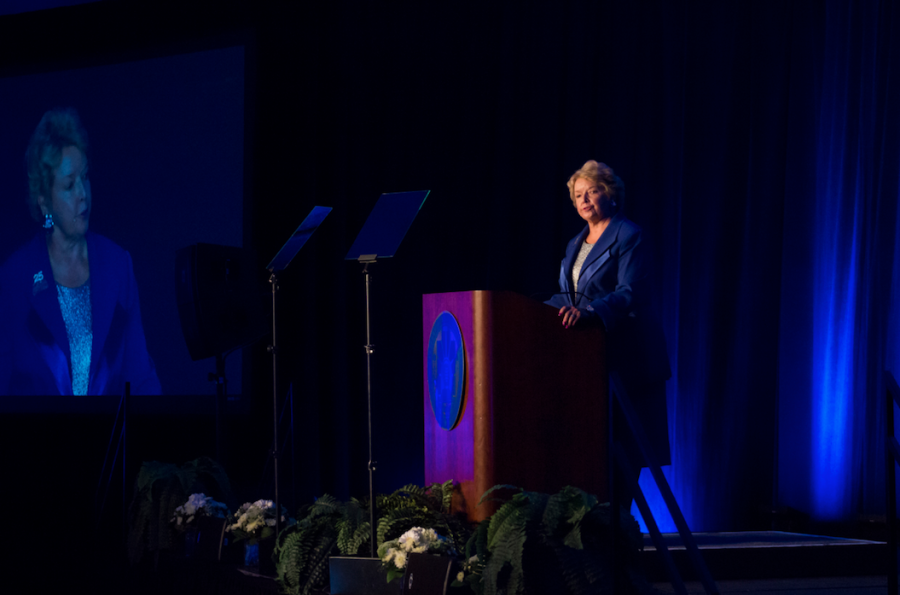[author title=”About the Author” author_id=”24″]
President Haynes will be one of six CSU women presidents honored by Leadership California for her success in higher education and leadership.
Leadership California, a network of more than 1,500 successful women committed to female leadership in the state, recognize women leaders who create instrumental change in their fields. Alongside the presidents of Cal Poly Pomona, CSU Long Beach, CSU Fullerton, CSU Northridge and Humboldt State, Haynes will be honored with the Trailblazer Award in a ceremony on April 27 in Los Angeles.
Prior to her tenure as President of CSUSM since 2004, Haynes has had a successful career in higher education. She received her bachelors degree from Goucher College in Maryland, Masters of Social Work degree from McGill University in Canada and her Ph.D. from the University of Texas, Austin. She went on to become an Assistant Professor at Southwest Texas State University, and Assistant Professor and later Associate Professor at Indiana University. In 1985 she became the Dean of the Graduate School of Social Work at the University of Houston and became the President of the University of Houston-Victoria in 1995.
Haynes has been widely recognized for her achievements in championing women in leadership, in addition to her commitment to educational equity and public higher education. She said that her success as president is derived from having a career in social work and bringing traditionally “feminine” skills to the table.
“Women tend to bring skill sets that are more collaborative,” Haynes said. “In my early years, I would say that people talked about those ‘soft skills’ in a derogatory way. However, they actually take practice, patience and I think that they are necessary to university leadership in these days and times.”
Haynes has broken down numerous gender barriers while serving in higher education. She was the first female dean at the University of Houston, is the senior female president in the CSU system and first female president of CSUSM. In November, she ranked third on Social Work Degree Guide’s list of “The Thirty Most Influential Social Workers Alive Today.”
She has promoted multiple women at CSUSM to top leadership positions like the Vice President for Finance and Administrative Services, Vice President of Student Affairs and Vice President of Community Engagement. Haynes said that her passion for helping women move into leadership positions reflects her desire to make women’s accomplishments seen as the norm.
“The role of the president is essentially building relationships and building coalitions and helping to influence people not through control but conversation,” she said. “It is both intersection of what might be seen as feminine and feminist leadership skills with a set of social work values, which is often what the academy misses.”
While women have made tremendous strides in leadership, only six of the 23 CSU Presidents are women. Haynes said that a lot of progress still needs to be made to ensure that women continually ascend to leadership positions so that the numbers do not stagnate.
“Glass ceilings and a lack of progress worries me,” she said. “There are many more women on university campuses who are reaching full professor positions but we still are about a quarter of all of the presidents. So how much of this is due to the vision of the president position and what it takes? And how much is it the continued, external barriers and stereotypes that still exist?”
Haynes said that the absence of women in leadership roles can partially be attributed to rigid hiring guidelines that discourage both women and marginalized individuals from applying for these jobs.
“When hiring, I always want to choose the best person. But I learned long ago that you can easily exclude people who have been underrepresented in these positions inadvertently because of past precedents,” she said. “Job descriptions often exclude women and people of color because they say ‘you have to have these three steps to apply.’ In my case, I moved from dean to president without having been a vice president, and I moved from faculty to dean without being an associate dean. This has helped me to see that in the job process, people do not put the right lens on and see that they are reducing applicants by restraining what needs to be done before applying.”
Haynes said that leading by example is key to seeing more shifts towards female leaders.
“Many presidents today are in their late 50s and 60s,” she said. “If we are not building a diverse group of presidents to lead, there is going to be a failure in higher education to have really taken the lead here. How can we expect corporations to do it if we cannot do it ourselves?”
Despite her tremendous success in academia, Haynes continually approaches her position and its challenges with a grounded, positive attitude.
“University presidents can often take themselves too seriously,” she said. “It is a serious position with a lot of responsibility and authority, but I have learned that I can be authentic and be myself. When I realized that I could be serious and myself and be effective as a female leader, that was a major breakthrough for me.”


